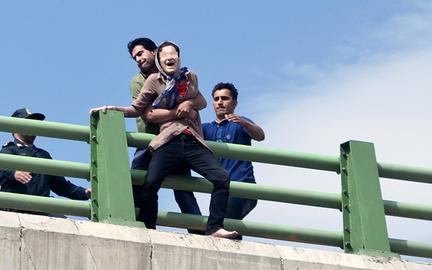“This is the last day of my life,” Saeed says in Turkish, leaning against a wall. “I want to leave this world. I leave this video for those who know me and I want them to forgive me.” Then he bursts into tears and asks his parents for forgiveness too.
Saeed was 19. In mid-March, after posting a video on his Instagram page — in which he said the words above — he climbed up on a half-finished building in Shariati Square in the city of Ardabil and jumped. A video of the suicide recorded by passersby show him pulling back before jumping a few moments later.
But he is not the only teenager who decided to commit suicide in public in the last month. On February 28, it was reported that two teenage girls in Tabriz had attempted suicide. Both 17, they jumped off a pedestrian bridge. A day later, a 15-year old girl in Zanjan threw herself off a bridge. All three girls lived, but the fact that they attempted to take their lives — and in a very public manner — reveals a disturbing trend.
“Suicides in public are meant to send a message — a message of protest and a cry for attention,” Dr. Rabe’e Movahed, a Tehran psychiatrist, told IranWire. “We must find out what they were protesting against. What makes them want to throw away everything and sacrifice their own lives?”
Physical, social and, of course, emotional changes are usually the primary factors in developing depression among teenagers, which Movahed describes as “very prevalent.” According to her, in Iran, one teenage in five suffers from depression.
“Without a doubt, often the families play an important role as well,” Movahed said. “They push their children to come on top in competitions with their relatives and neighbors, but they pay no attention to the abilities of their children. This imbues the teenager with anxiety and this anxiety leads to frustration, isolation and depression.”
Symptoms of Depression
Dr. Movahed said that the families must pay attention to their teenage children and look for symptoms of depression. And if they believe their children are depressed, they must try to get them to see a psychologist. “A depressed teenager is melancholic for no good reason and infuriated easily. Many complain of physical pains like headaches and stomach aches. They feel that nobody cares about them and everybody ignores them. They fail at school, do not talk much and show no self-confidence.” She added that other factors contributed to depression among teenagers, such as a family’s financial difficulties, parents divorcing or the death of a close relative.
I spoke to Maryam, whose 18-year-old son Ali committed suicide in 2007. “The pain of losing a child is excruciating enough,” she said. “But it is more excruciating if your child does it by his own free will. It means that the world that you created for him was so dark and hopeless that he decided to leave it behind.”
Ali fell into depression when he was 13 because of family problems. “After we divorced, my son became depressed,” Maryam said. She put him under the care of a psychiatrist. “He started to feel much better until he entered military service. Before he joined the military, I asked the doctor whether it would be all right for Ali to do. ‘Yes,’ he said. ‘Ali is very isolated. Serving in the military will help him to socialize.”
But he never finished his service. Out on leave one day, Ali went to a park in his father’s neighborhood, took some pills and laid down under a tree to die. “Do you know how a mother whose child has committed suicide feels?” Maryam said to me. “It is like my heart is burning all the time.”
But Dr Movahed suggests Ali’s doctor did not necessarily give the correct advice. “The conditions of a conscript can aggravate depression because they are separated from their families and they have to deal with the strict discipline in the barracks,” she said. “Similar things happen to students who live in dormitories. Being away from their families and a different environment can make depression worse.”
M.A., a sociologist in Tehran who wanted to remain anonymous for reasons of safety, also pointed to depression as a root cause of most suicides — and more often than not, this depression is spurred on by financial difficulties. “Statistics show that the age of suicide in Iran has fallen, but older people are usually more successful in their attempts. Unemployment or failure to find the right job, class inequality and envy are also contributing factors.”
“I am not a bum!”
Mohammad is a firefighter. A few months ago, he helped save a young man who attempted to jump from the seventh story of a building in western Tehran. The young man’s words are still with him.“He was maybe 24 or 25,” Mohammad said. “He was shouting, ‘I swear to God, I am tired of it. I am not a bum. There is no job to be had!’ Apparently he had lost his job a few months earlier and that day he and his father had gotten into an argument over work. I believe his father had called him a ‘bum.’ I remember his tears made my cry.”
The sociologist M.A. said the financial divide between classes is a big part of the economic struggles that lead to teenage depression. “A teenager constantly compares his situation with others,” he said, “and when he sees that his friend has things to play with or a car that he himself cannot afford, he loses self-confidence and gets into depression. Besides this, many parents compare their children with others and tell them: ‘look, that guy gets better grades or this one behaves so well.’ Such comparisons make the teenager feel less competent than [his peers] and he becomes frustrated. A teenager lacks the maturity of a middle-aged person and lack of experience makes him more vulnerable.”
Shayan, who is now 20, attempted suicide when he was 15. “I took pills,” he told me. “I took 20 or 30 pills of every kind that I could find. My grades were awful and my father took away my laptop and my mobile. And I wanted to show them.” But his family found him in time. “The pill bottles were there,” he said. “In fact I wanted to spite them. I was not really aware that what I was doing was such a dangerous thing.”
Shayan’s parent took him to Loghman Hospital, where doctors pumped his stomach and saved him. Now he is sorry for what he did. “More than anything else I remember that day for the black liquid that they force-fed me and for the tears in my parents’ eyes,” he said. “It was a childish thing to do. My parents aged 10 years on that day.”
For some time after the incident, Shayan saw a psychiatrist. In group therapy sessions, he talked to people like himself who had attempted suicide. “I think there are many like me who attempted suicide to show spite,” Shayan said. “But then sometimes things get out of hand and become serious.”
More on young suicides in Iran:
Why are Iranian Teens Choosing Suicide?, June 2016
Student Suicide on the Rise, May 2015
Military Service: A Nightmare for Minority Recruits, April 2015
visit the accountability section
In this section of Iran Wire, you can contact the officials and launch your campaign for various problems

























comments